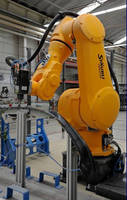Innovative Machining Robot for Model and Mold Making

Step change in technology
Although the design of plastic exterior parts for the automotive industry is nowadays accomplished by means of sophisticated computer systems, traditional mold making and hand-finishing methods still dominate production. Austrian premium manufacturer POLYTEC is now using state-of-the-art robotic machining, and is thriving on it.
The POLYTEC GROUP ranks as one of the world’s leading manufacturers of high-quality plastic parts operating at 21 sites and employing over 3,500 people worldwide. With headquarters in the Austrian town of Hörsching, the company has made a name for itself as a manufacturer of plastic and stainless steel OEM parts for top global brands in the automotive industry.
While some divisions in the group have increasingly turned to supplying markets outside the automotive industry, Hörsching-based POLYTEC CAR STYLING is entirely focused on the vehicular sector. In collaboration with the automotive industry, the company designs, develops and produces exterior plastic parts both for series production and as OEM components. Services include design, CAD engineering, mold making and tooling, production and all the associated logistics.
It is the pursuit of excellence and the use of cutting-edge technologies that characterize this Austrian manufacturer. No wonder, then, that POLYTEC CAR STYLING, a specialist manufacturer of car spoilers, has been on the lookout for modern processing methods for the production line, since up until now, machining of holes and cut-outs in plastic panels has been done manually, as has finishing prior to painting.
New method with many advantages
Since March 2012, an innovative robot station has been doing things very differently. In the short time since commissioning, the brand new facility which produces front spoilers and other components for renowned sports car manufacturers has already proven its worth. A Stäubli six-axis TX200 robot offers many benefits – precision and reliability – and has numerous applications, as Gerhard Fürst, model and tool making manager at POLYTEC CAR STYLING, told us: "The robot is a genuine all-rounder. We currently use it for milling, drilling and sanding of front panels for various exterior parts. With the robot, we can machine plastic components quickly and economically in one pass and with a high degree of precision."
In order to complete the full range of tasks, the robotic station is equipped with an automatic tool-changing station, enabling the TX200 to select the tool required. To complete machining of a front spoiler, the task is sequenced as follows: holes are first drilled, cut-outs milled and then the surface is sanded for painting. The robot performs these complex tasks with a high degree of precision in a matter of minutes.
Robotic manufacturing and manual labor side by side
A quick look back at the traditional way of working with patterns and molds reveals the quantum leap that has taken place with the arrival of the robot station. When Gerhard Fürst gets out the mechanical jig previously used to produce Aston Martin front spoilers, the differences as compared to robotic processing become immediately obvious. Eight power tools, ranging from router to drill are grouped around the elaborate, complicated piece of equipment. The operator had to carry out each processing step manually, selecting the equipment needed for each particular task in turn. A time-consuming quality control check then had to be carried out to make sure that all tasks had been properly performed.
Modern robot machining is very different. The operator just places the front spoiler in the robot station’s clamping device and starts the program by simply scanning the component code. The six-axis robot takes care of everything else, and the only task remaining is some manual finishing of the plastic parts, deburring holes and cut-outs in poorly accessible places.
The policy at POLYTEC is not to pursue the goal of full automation at any price, but to have a sensible degree of automation that ensures maximum efficiency. Gerhard Fürst: "Our mix of hand finishing and automatic robot machining gives us a high degree of flexibility and excellent productivity. It is particularly worth noting that this hybrid solution ensures efficiency and quality at the highest level, which is exactly what our customers in the automotive industry value."
Efficiency and quality
The Stäubli TX200 reduces processing time by a minimum of 30 percent from start to finish, depending on the model of car that the component is intended for. There are other significant time savings gained from dispensing with the old-fashioned jig. Teaching the robot how to deal with new model types takes just a few hours, whereas the construction of a new jig would take days.
The robot shows its flexibility yet again when converting the station to meet the needs of a different model, dramatically reducing downtime, since a practised worker can manually replace clamping devices in under five minutes with the aid of a pallet truck.
Another plus for the client: the robot station removes the dread of making alterations to components. Gerhard Fürst: "With just a few clicks of the mouse, we can now carry out modifications to tools and equipment that in the past would have been extremely labor intensive and costly."
And at the same time, the quality of the robot machining is never in doubt. Every hole and cut-out is perfect, thanks to the robot's precision. Everyone at POLYTEC CAR STYLING is also extremely impressed with the 100% repeatability of the robot's high-precision machining. Process reliability is thereby ensured, guaranteeing that even the most rigorous OEM standards can be met.
Neither management nor employees are in any doubt about the worth of the investment made in the robot station, since it fulfills the entire range of the factory's varied requirements perfectly. Gerhard Fürst tells us that there were several reasons behind the decision to acquire the big Stäubli six-axis TX200: "Firstly, Stäubli's team took a lot of time to fully assess the task in hand, and secondly, the TX200 fits the bill wonderfully well due to its superior drive technology. The robot is not only very precise and nimble but is totally reliable, even in dusty conditions, thanks to its fully enclosed design. Moreover, it has a large 2.2-metre working range that will safely take care of all our applications."
For more information, please contact:
Stäubli Robotics (Germany)
Sonja Koban
Head of Marketing
Tel: +49 (0)921 88 32 12
Fax: +49 (0)921 88 34 44
s.koban@staubli.com
About Stäubli: Textile machinery, connectors and robots
Stäubli is a mechatronics solution provider with three dedicated divisions: Textile machinery, Connectors and Robotics. Based in Pfäffikon (Switzerland), employing more than 4,000 people at sites in 25 countries and represented by agencies in 50 others, Stäubli ranks as a major global company.
www.staubli.com




